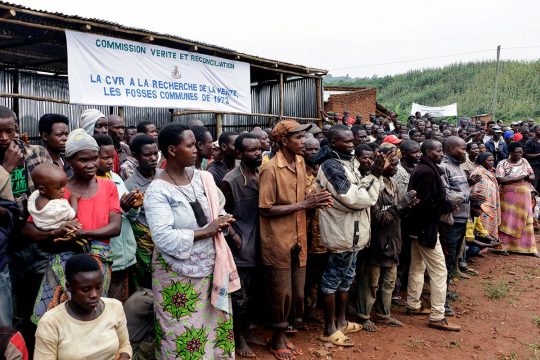Burundi has suffered a year of bloody crisis, born of President Pierre Nkurunziza's divisive bid for a third term, which he secured last July.
The opposition maintains that Nkurunziza's move was unconstitutional and violated a peace deal that ended a 1993-2006 civil war.
More than 500 people have been killed in the violence and more than 270,000 have become refugees since the crisis erupted, according to the UN.
- Demonstrations start -
April 25, 2015: Nkurunziza declared candidate for a third term in office by his ruling CNDD-FDD party. The following day thousands of protesters demonstrate in several parts of the capital, the start of six weeks of almost daily demonstrations in Bujumbura that are clamped down on by police.
- Failed coup -
May 13: A top Burundian general, Godefroid Niyombare, announces the overthrow of Nkurunziza, hours after the president flew to neighbouring Tanzania for talks with regional leaders on ending the crisis.
May 15: Coup leaders announce they will surrender, before being arrested by loyalist forces. Nkurunziza returns to the presidential palace in the capital.
- Defections -
June 28: Parliament head Pie Ntavyohanyuma says he has fled to Belgium denouncing the president's "illegal" third term bid. He joins a long list of opposition leaders, journalists, members of civil society, and even disillusioned members of the ruling party who have chosen exile.
- Nkurunziza re-elected -
July 21: Nkurunziza is re-elected as expected in an election boycotted by the opposition.
- Targetted attacks -
August 2: General Adolphe Nshimirimana, widely seen as the central African nation's de facto internal security chief and considered the regime's number two, is killed in a rocket attack.
An AFP journalist at the scene of his death in the capital is detained by government forces and beaten.
On August 3, human rights activist Pierre-Claver Mbonimpa, who had publicly opposed Nkurunziza's bid for a third term, is wounded by gunfire.
On August 15, Colonel Jean Bikomagu, the former head of Burundi's army during a 13-year civil war, is assassinated.
December 11: At least 87 people are killed in coordinated attacks by unidentified gunmen on three military sites that trigger a fierce riposte from the security forces.
- Risk of genocide -
December 17: The African Union says it will not allow genocide to take place in Burundi, as the UN orders a probe into widespread abuses and warns of looming civil war.
A day later, former president Pierre Buyoya warns of the "risk of genocide".
- UN police -
April 2, 2016: The UN Security Council unanimously backs a resolution that lays the groundwork for deploying UN police officers in Burundi.
In mid-April UN chief Ban Ki-moon proposes three options for a new UN police mission there, ranging from a full force of 3,000 officers to a quick dispatch of 20 to 50.
In late January, the African Union had shelved plans to send a peacekeeping force to Burundi, amid reticence by several African heads of state and opposition figures in the country.
- Torture -
April 18: UN human rights chief Zeid Ra'ad Al Hussein voices alarm at a sharp increase in the use of torture and ill-treatment, with at least 345 cases recorded so far this year. "Perpetrators of torture and ill-treatment have so far enjoyed total impunity," he warns.
- ICC probe -
April 25: Tutsi general and security advisor Athanase Kararuza is killed by heavily-armed men.
The International Criminal Court says it is opening an investigation into the violence.





